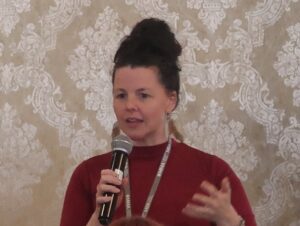Who is a member?
Our members are the local governments of Massachusetts and their elected and appointed leadership.

Betsy Neptune of Neptune Coaching discusses constructive criticism during the Women Leading Government annual conference on March 6 in Wrentham.
How to best advocate for oneself and strategies for providing constructive feedback were two key topics of discussion during the fifth annual Women Leading Government conference on March 6 in Wrentham.
During an interactive discussion, panelists shared stories and strategies for how to best advocate for yourself, and how to help colleagues do so.
Lexington Deputy Town Manager Kelly Axtell, a self-described introvert, shared her experiences being asked to serve in interim roles, and how she learned to advocate for herself to make sure she was compensated appropriately for taking on additional responsibilities.
“[Do] whatever you need to do to get yourself there — whether it’s self-talk, whether it’s talking to a friend to make sure that they’re telling you what you need to say, or a trusted colleague,” Axtell said. “We deserve what we deserve, and we need to be able to say out loud, ‘This is what I’ve done. This is why you need me.’”
North Andover Town Manager Melissa Rodrigues discussed times when, in addition to salary, she had to negotiate for needs to provide a better work-life balance for her family, and times when she has managed employees who struggled to recognize their worth.
“If you don’t advocate for yourself, no one but your mother will do it,” she said. “You can’t feel bad about it, and you can’t be sorry.”
Auburn Acting Town Manager Dori Vecchio shared tips for resume-writing. She recommended adjusting resumes to specific roles and communities; spending time familiarizing yourself with the community’s issues and values; and not using templates or AI. She said watching interviews of your peers, as well as your own, can be helpful to learn what you could be doing better.
“Confidence in yourself is so important,” Vecchio said. “Don’t lowball yourself ever.”
Attorney Melissa Murray, a partner at Norris, Murray & Peloquin, advised working to find your voice, making sure you’re at the table, and making sure your name is visible in the projects you’re working on. She said negotiation is a valuable skill, not only to help reach the deserved compensation level, but also to show that you can handle tough situations and conversations well.

A panel of women municipal leaders discuss the ways they’re using artificial intelligence in their respective communities during the Women Leading Government Conference on March 6 in Wrentham. Pictured, left to right, are Concord Deputy Town Manager Megan Zammuto; Chelsea Deputy City Manager Devon Fields; Brookline Chief Information Officer Feng Yang; and Concord Chief Information Officer Amalia McCaffrey.
During a breakout session, attendees discussed how communities are using generative artificial intelligence.
Brookline Chief Information Officer Feng Yang discussed how her town is training employees to understand and handle the risks associated with AI, and working to make sure guardrails are in place.
“We want people to learn and understand this tool, but we want them to learn and understand security,” Yang said.
Chelsea Deputy City Manager Devon Fields shared examples of using AI tools as a starting point for tasks like developing an office dress code or updating routine interview questions, and then workshopping those results within teams.
“I went to ChatGPT and I said, you know, MUNIS is this software, this is what we’re trying to achieve with this specific module,” Fields said. “‘Can you give some examples of roles and permissions?’ I augmented that to fit exactly what we were looking for.
“I shopped it around with some of our smaller groups, and that was a great way to get buy-in and to help us move forward in this process-oriented challenge.”
Concord Chief Information Officer Amalia McCaffrey discussed the available AI tools and what each can provide, including tools for writing and podcasting. She stressed that AI “will always require human oversight.”
“It’s not meant to replace [humans],” she said. “It’s meant to enhance the things that we do.”
Betsy Neptune, executive coach and leadership consultant at Neptune Coaching, led a session about managing emotions and expectations in order to effectively provide constructive feedback.
“I believe that the better you get at receiving it,” she said, “the better you’re going to be at giving it.”
A number of dynamics affect how feedback is given and received, such as the diverse nature of cultures and communication styles, and the public sector environment. Balancing fear and empathy is a vital part of being able to have difficult conversations — recognizing the fear that a conversation will be difficult and might not go well, but that it comes from a place of caring and wanting to help the employee to do better.
“Our brains are actually hardwired to seek social harmony,” Neptune said. “Your brain is going to do everything possible for you not to have that hard conversation, because your brain wants to preserve you and to have a good relationship.”
Neptune suggested asking staff how they like to receive feedback, both positive and critical, which can have the added benefit of building a sense of safety within a team.
It is difficult but important not to judge your performance based on someone’s reaction, she said, and to take time afterward to review your notes and determine if you had the conversation you set out to have.
Neptune discussed how to receive constructive feedback, and how to hear the value in any feedback, which requires managing the same dynamics and defensive threat response.
“It’s not about my identity, but this is about what I do,” Neptune said.